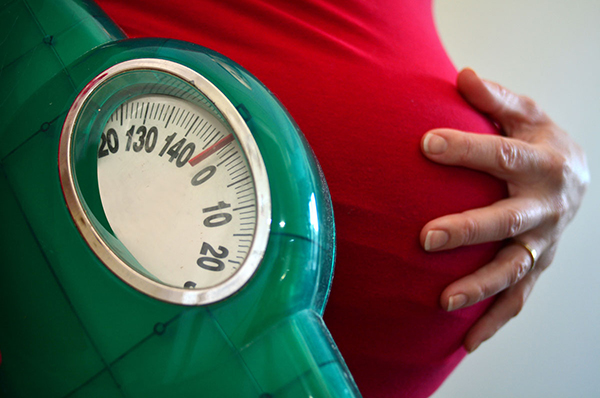
Excessive weight gain during pregnancy could permanently slow metabolism and lead to weight gain in later life, according to the results of a mouse study funded by the National Institutes of Health.
Mice fed a high-fat diet during pregnancy gained weight but lost it soon after giving birth and resuming a normal diet. Months later, however, the animals began gaining weight, ultimately gaining twice as much weight as a comparable group of mice fed a lower calorie diet during pregnancy.
The study was led by Jianhua Shao, Ph.D., of the University of California San Diego and appears in the International Journal of Obesity. Funding for the study was provided by NIH’s Eunice Kennedy Shriver National Institute of Child Health and Human Development, National Institute of Diabetes and Digestive and Kidney Diseases, and National Center for Advancing Translational Sciences.
Background
The authors noted that the obesity rate among women is about 4 percent higher than among men. Previous research has linked excessive weight gain during pregnancy to obesity in later life, but it is not known why pregnancy weight gain might influence weight gain many years later. A possible explanation is that high weight gain in pregnancy is retained after the baby is born and then accumulates through the years. Another possibility is that high weight gain in pregnancy alters metabolism directly, making it easier to gain weight later in life.
Results
The researchers fed a high fat diet to mice during pregnancy, and the animals gained more fat than a comparable group of mice fed a normal diet. After the high-fat fed mice gave birth, the researchers switched them back to a normal diet. The animals lost the extra weight and soon had the same proportion of body fat as the mice fed a normal diet during pregnancy.
Within 3 months, however, the mice fed a high fat diet during pregnancy began accumulating fat, even though they remained on a normal diet. By 9 months, they had twice as much body fat as the mice fed a normal diet during pregnancy.
The researchers found that, while the blood of both groups of mice contained comparable levels of estrogen, the fat cells of the mice that received the high-fat diet were less able to use estrogen, indicating slower metabolism. The high-fat mice also had brown fat that used less energy than the brown fat in the mice fed a normal diet. Unlike white fat, which stores energy for later use, brown fat burns energy to produce heat.
Significance
The researchers concluded that excessive weight gain in mice during pregnancy leads to changes in how fat cells use estrogen, resulting in a slower metabolism and a tendency to gain weight. Additional studies are needed to determine if excessive weight gain in human pregnancy also leads to a permanent change in metabolism that contributes to obesity later in life.
Reference
Qiao, L, et al. High-fat feeding reprograms maternal energy metabolism and induces long-term postpartum obesity in mice. International Journal of Obesity. 2019. https://doi.org/10.1038/s41366-018-0304-x .

 BACK TO TOP
BACK TO TOP